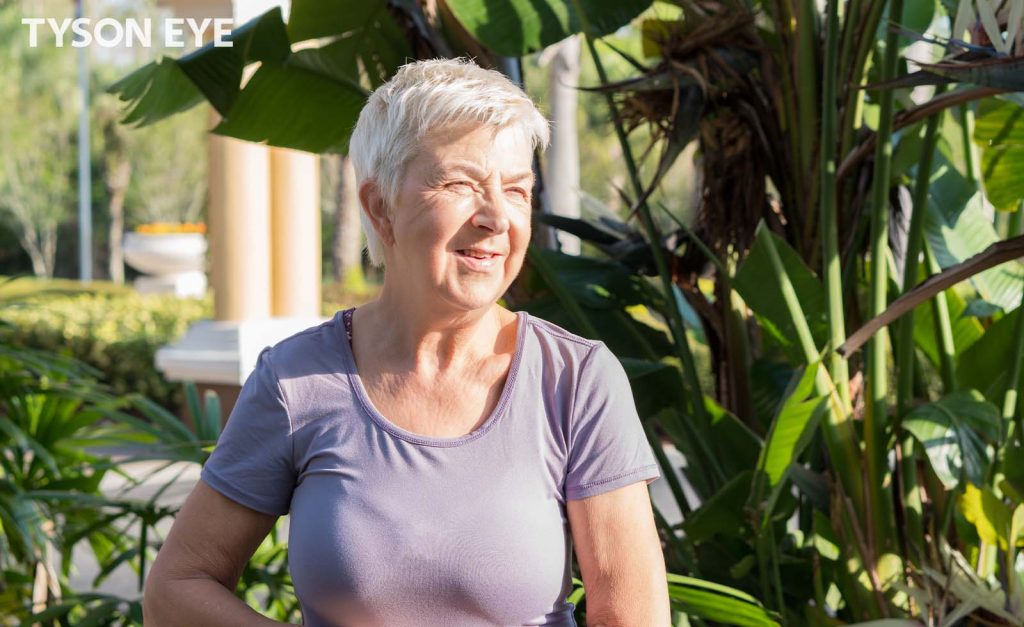While fine wine gets better with age, unfortunately, the same cannot be said about our vision. Some eye issues, like losing the ability to read clearly or focus up close, will naturally occur with almost everyone as they get older. Cataracts are another condition that naturally occur as we age. Other conditions like macular degeneration or glaucoma, although fairly common, may not affect everyone.
The good news is with routine eye exams, these age related conditions can be effectively managed to keep your vision sharp! Along with regular eye exams, a healthy diet and lifestyle are also beneficial to keeping your eyes in great shape. If we notice any sudden changes or abnormalities with our vision, this can be caused by more urgent conditions which should be evaluated by an eye doctor as soon as possible.
Below are ways our vision changes as we age and what can be done to manage these changes.
Presbyopia
As we enter our 40s nearly everyone begins to notice changes to our near vision which often affects our ability to read small text. This is caused by the lens of the eye becoming less flexible (a process called presbyopia). There are many ways to overcome this challenge, including reading glasses, progressive lenses, multifocal contact lenses or even vision correction surgery, such as LASIK or clear lens exchange.
Dry Eye
Many think of dry eye as a condition that causes discomfort to the eyes but what may be overlooked is how dry eye affects our vision. The tear film that coats our eyes provides protection, hydration and maintains the health of the cornea which is the outer surface of the eye. Dry eye occurs when tear production and drainage are out of balance. Although dry eye can occur at any age, it is more common in people over the age of 50. The most common treatment for dry eye is artificial tears.
Cataracts
Cataracts can develop at any age, however most people are not affected by cataracts until they are into their 60s. Cataracts are a build-up of protein in the natural lens of the eye, which makes symptoms slowly progress as we age. When cataracts begin to affect your normal activities, it’s time to schedule an appointment with an eye doctor. If diagnosed with cataracts, you and your ophthalmologist will decide on the best intraocular lens for the vision you expect after cataract surgery. Cataract surgery is one of the safest and most common procedures in the world.
Age-Related Macular Degeneration (AMD)
This condition affects the central portion of the retina, which is known as the macula. The most common symptom of AMD is gradual loss or blurriness of the central vision. People over the age of 50 are at a higher risk of developing age-related macular degeneration. AMD can be diagnosed by your eye doctor. If found, treatment is best performed by an ophthalmologist specializing in the retina.
Glaucoma
This condition occurs when pressure in the eye increases above normal levels. Glaucoma is one of the leading causes of blindness in people over 60 years old. If left untreated, glaucoma can irreversibly damage the optic nerve leading to vision loss. Glaucoma can be managed with medicated eye drops, minimally invasive glaucoma surgery, or slow release implants placed in the eye.
Droopy Eyelids
Over the age of 50 our muscles begin to lose some strength and droopy eyelids may develop. Some might consider eyelid surgery as a cosmetic procedure but the excess tissue above the eye can obstruct portions of the field of vision making the procedure medically necessary for some people. Insurance will cover surgery for those suffering from ptosis or droopy eyelids if it affects your vision.
Whatever age you are, you can trust the expert eye doctors and surgeons at Tyson Eye to help protect your vision throughout your life.
Tyson Eye is regarded as one of the premier eye care centers in Southwest Florida. Our surgeons and doctors have helped thousands of Floridians enjoy better vision and have consistently introduced break-through technology, such as our bladeless laser cataract surgery to the area. We are committed to excellence by delivering modern technology with old fashioned concern.
Call us at 239-542-2020 or request an appointment today!
